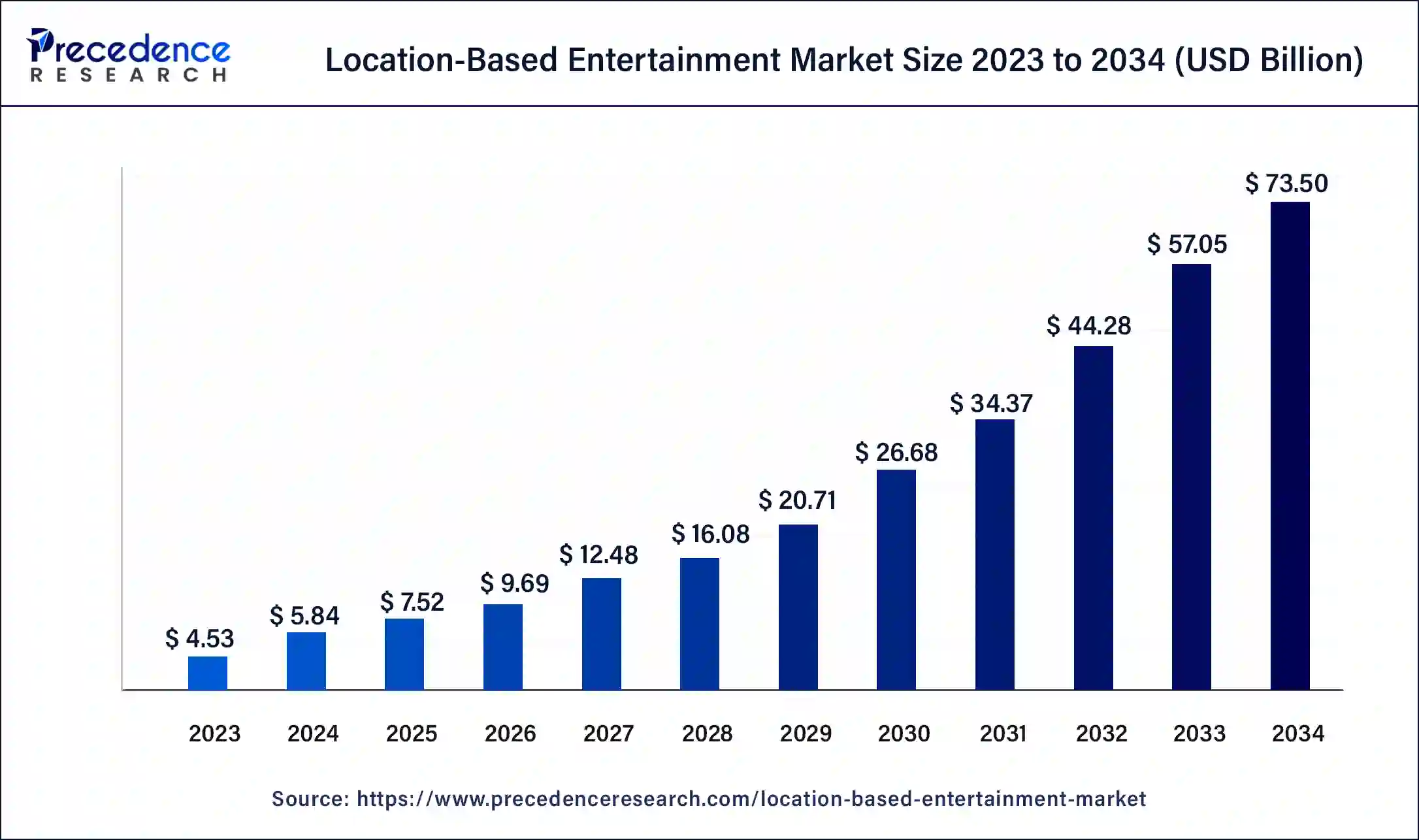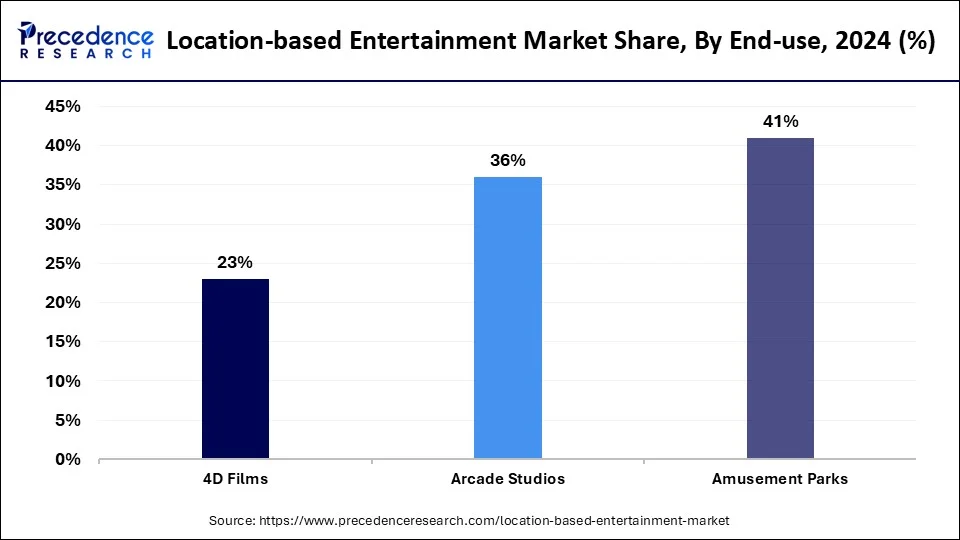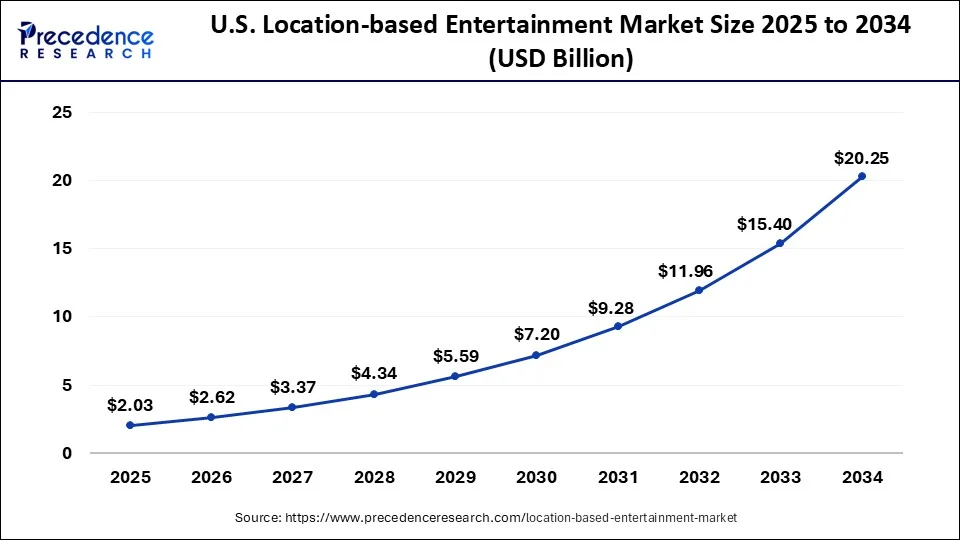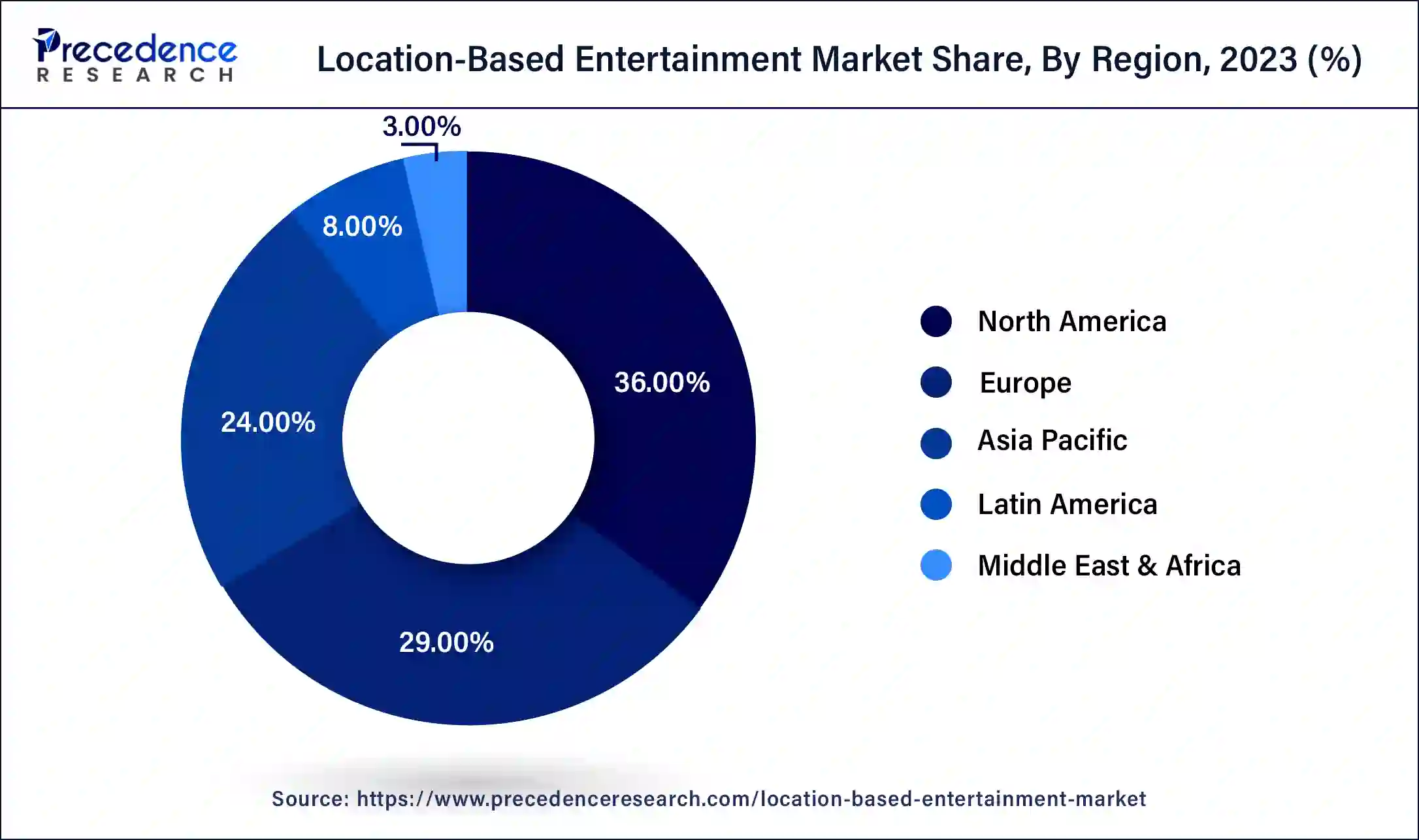What is the Location-based Entertainment Market Size?
The global location-based entertainment market size was estimated at USD 7.52 billion in 2025 and is predicted to increase from USD 9.69 billion in 2026 to approximately USD 87.50 billion by 2035, expanding at a CAGR of27.81% from 2026 to 2035. The growth of the location-based entertainment market can be attributed to an increase in consumer inclination towards amusement parks, arcade studios, 4D films, etc

Location-based Entertainment Market Key Takeaways
- In terms of revenue, the global location-based entertainment market was valued at USD5.84 billion in 2025.
- It is projected to reach USD 73.5 billion by 2035.
- The market is expected to grow at a CAGR of 28.82% from 2026 to 2035.
- North America dominated the location-based entertainment market with the largest market share of 36% in 2025.
- Asia Pacific is expected to grow at a double-digit CAGR of 31.05% over the forecast period.
- By technology, the 3 dimensional (3D) segment has contributed more than 44% in 2025.
- By technology, the cloud merged reality (CMR) segment is expected to grow at a significant CAGR over the forecast period.
- By component type, the hardware segment accounted for the biggest market share of 66% in 2025.
- By component type, the software segment is projected to expand at the fastest CAGR of 30.04% during the forecast period.
- By end-use, the amusement parks segment generated the major market share of 41% in 2025.
- By end-use, the arcade studios segment is anticipated to grow at the fastest CAGR of 31.05% over the projected period.
Market Overview
Location-based entertainment is defined as experiences that depend on physical location, such as amusement parks, themed attractions, and virtual reality centers. These experiences also utilized innovative technology like augmented reality (AR) and virtual reality (VR) to build immersive environments for guests. The future of the location-based entertainment market seems promising, with advancements and opportunities fueled by technological breakthroughs and increasing consumer demand for interactive experiences to improve customer engagement and satisfaction.
How AI is Changing the Location-Based Entertainment Market
In the location-based entertainment market, AI mainly improves the entertainment experience provided by AR and VR technologies and can enable AR and VR to understand natural language, analyze data, recognize objects, and generate realistic simulations by providing personalized and adaptive content that matches user preferences and demands. AI-created intelligent avatars are revolutionizing the VR scene. These avatars can adapt and respond to operators' emotions and actions in real-time. This stage of responsiveness improves social interactions within virtual space that can give a diverse experience to the user.
- In July 2024, Shemaroo Entertainment partnered with game-developing company GMetri to expand its metaverse platform, ShemarooVerse, into artificial intelligence (AI) based gaming. As per this partnership, some IP-based games featuring popular Bollywood movies will be made available on the Web3 platform.
Location-based Entertainment Market Growth Factors
- Increasing consumer demand for unique experiences is expected to drive the location-based entertainment market growth shortly.
- Rising investment and development in the industry can fuel the location-based entertainment market growth in the near future.
- Continuous improvements in VR, AR, and other advanced technologies can boost the location-based entertainment market growth further.
Location-based Entertainment Market Outlook
- Industry Growth Overview: The rapid evolution of the industry can be supported by the increase in consumer expenditure on experiential entertainment and the introduction of the latest technologies. The introduction and implementation are being accelerated by collaboration between content creators, technology vendors, and venue managers.
- Global Expansion: Asia-Pacific, North America, and the Middle East are the greatest contributors to the international growth due to urbanization and an increase in tourism, mega construction of malls, and theme parks. Some of the ways by which companies are expanding include franchising, flagship, and regional partnerships.
- Major Investors: Comcast (Universal), Sony, Tencent, and Sequoia Capital are the major investors. These players are investing in immersive experiences, IP experiences, and next-generation entertainment platforms.
- Startup Ecosystem: There is also a vibrant startup ecosystem whereby companies have created VR arcades, interactive experiences, and AI-driven content platforms. It has Sandbox VR, Dreamscape Immersive, and The Void, which are high-engagement experiences that involve technology.
Market Scope
| Report Coverage | Details |
| Market Size by 2035 | USD 87.50 Billion |
| Market Size in 2025 | USD 7.52 Billion |
| Market Size in 2026 | USD 9.69 Billion |
| Market Growth Rate from 2026 to 2035 | CAGR of 27.81% |
| Largest Market | North America |
| Base Year | 2025 |
| Forecast Period | 2026 to 2035 |
| Segments Covered | Component Type, Technology, End-use, and Regions |
| Regions Covered | North America, Europe, Asia-Pacific, Latin America, and Middle East & Africa |
Market Dynamics
Driver
Growing consumer spending on games and video content
Users continually seek different sources of entertainment. They spend more money on buying subscriptions to entertainment parks, which can offer them an immersive experience. Players in the location-based entertainment market are also building content that is convenient for adults and children. Additionally, companies emphasize providing escape rooms, free user movement, and other content segments specific to consumer needs for standard-quality content. These factors raise consumers' expenditure on games and video content, which fuels market growth.
- In May 2024, iQIYI, a leading online entertainment service in China, announced the launch of a VR immersive theater on the first floor of Galaxy Promenade in Galaxy Macau this summer, adapted from its hit series Love Between Fairy and Devil, showcasing iQIYI's commitment to expanding location-based entertainment through its a unique blend of 'IP+ Technology.
Restraint
Economic and environmental factors
Economic hurdles, shifts in customers' buying habits, and natural disasters like pandemics can have a significant impact on tourist amounts. These factors can cause revenue fluctuations and might make it relatively difficult to keep operations persistent without losing profit. Moreover, rapid technical obsolescence can hinder the location-based entertainment market growth further.
Opportunity
Growing popularity of 360-degree content
The launch of 360-degree content is driven by various developments in VR as well as 3D, 4D, and 5D technologies, which can lead to major technological advancements in the entertainment sector. Furthermore, 360-degree content improves the experience of the viewer by providing an all-around view of the scene. Hence, the increasing popularity of 360-degree content, along with the advent of location-based VR as a main entertainment platform, will likely impact the location-based entertainment market positively. This new market trend can present market opportunities for the future.
- In June 2024, Paris-based production company Cercle launched a traveling, 360-degree immersive concert installation called Cercle Odyssey. The structure blends live music with a new type of visual storytelling. Cercle will collaborate with artists from various genres and backgrounds, but particularly with those who blend auditory and visual elements together.
Segment Insights
Technology Insights
The 3 dimensional (3D) segment dominated the location-based entertainment market in 2024. This is due to the rise in adoption in the entertainment industry, such as the significant developments in 3D mapping, 3D animation, and other technologies. The adoption of 3D technology in location-based entertainment has grown substantially. For example,3D printing has gained rapid traction in the film industry for various applications, such as designing famous costumes.
- In January 2024, Apple Vision Pro announced the launch of 150 3D movies, immersive films and series, Disney+, Max and more. Apple has detailed several entertainment experiences that will be available at the launch of its mixed-reality Apple Vision Pro.
The cloud merged reality (CMR) segment is expected to grow at significant rate in the location-based entertainment market over the forecast period. This technology combines physical and virtual environments by utilizing cloud computing. Which enhances the user experience by blending virtual reality and augmented reality features into the real world. The segment growth is fueled by the growing popularity of innovative content production and innovations in AR and VR technology.
- In May 2023, ARound, a next-generation fan engagement platform designed to enhance gameday fun with live, real-world augmented reality (AR) Experiences, has hired Dana Ware as its first chief creative officer, overseeing creative strategy and interactive storytelling for ARound's stadium-level shared AR experiences as it expands to new venues and partners.
Component Type Insights
The hardware segment led the location-based entertainment market in 2023. This can be linked to the technological developments in haptic suits, headsets, and VR/AR-based gadgets. The increasing adoption of low-end VR headsets by location-based entertainment players especially bodes well for segment expansion in the upcoming years.
The software segment is projected to expand at the fastest pace in the location-based entertainment market during the forecast period. Software developers are in a continuous process of improving the LBE systems to provide their clients with unique content. Additionally, the integration of immersive technology like augmented reality, virtual reality, 3D mapping, and mixed reality is anticipated to boost the growth of the software segment soon.
End-use Insights
The amusement parks segment dominated the global location-based entertainment market in 2024. The growth of the segment can be attributed to the rising adoption of VR-based interaction technology across the amusement park industry to provide visitors with a real experience. Businesses are also focusing on utilizing technologically advanced devices at location-based entertainment places.
- In September 2023, Licensing agency WildBrain CPLG launched a location-based entertainment (LBE) division to move its portfolio of kids brands further into this global business sector through a mix of new theme parks and entertainment centers. The plan is to focus initially on building out WildBrain's brands in Asia Pacific, so former Paramount exec Evi Sari has been recruited to join the agency's senior leadership team and run the new division out of Shanghai as VP of LBE.

The arcade studios segment is anticipated to grow at a significant pace in the location-based entertainment market over the projected period. The capability to offer a smooth physical experience with virtual animation videos by technologically innovative equipment to improve the customer's experience is estimated to contribute to the market expansion.
Regional Insights
What is the U.S. Location-based Entertainment Market Size?
The U.S. location-based entertainment market size was exhibited at USD 2.03 billion in 2025 and is projected to be worth around USD 24.16 billion by 2035, poised to grow at a CAGR of28.10% from 2026 to 2035.

North America dominated the location-based entertainment market in 2023. The growth in the region is driven by raising awareness of the advanced technologies and the ongoing adoption of North America is also a home for several major key players. Furthermore, the effective use of LBE across various fields in the media and gaming industry can further support the region's market growth.
- In March 2023, the second Peppa Pig theme park in North America will open in North Texas in 2024. The Peppa Pig attraction will be built and run by Merlin Entertainments, a global leader in location-based entertainment, under a licensing agreement with Hasbro, which owns the Peppa Pig brand.

Asia Pacific is expected to grow at the fastest rate in the location-based entertainment market over the forecast period. This growth is fueled by increased disposable incomes, rising urbanization, and a growing need for immersive entertainment. Moreover, the region is considered a hub for leading virtual reality software and hardware market players. Who has created new business opportunities for the LBE market? Also, the availability of cutting-edge technologies gives LBE operators a major benefit in creating mind-boggling concepts that relate to customers.
- In January 2024, Sony Music Masterworks, a division of Sony Music Entertainment, announced a new strategic venture with Roast Productions, a live entertainment company founded by Bonnie Royal and Michael Stevens. Based in London and operating internationally, Roast Productions focuses on producing theatre, concerts, and family entertainment events.
Why Is the European Location-based Entertainment Market Experiencing Notable Growth?
The European location-based entertainment market is registering a strong growth due to the growing consumer demands for out-of-home immersive and social experiences. The increased usage of virtual reality, augmented reality, and mixed-reality attractions within theme parks, museums, shopping malls, and entertainment centers, focusing on entertainment, is increasing visitor engagement. The robust tourist movement around the European destinations and unremitting investments in experience-oriented retail are also sustaining the growth of the market.
The UK Location-based Entertainment Market Trends
The UK location-based entertainment sector is fast changing, and this is because the popularity of VR arcades, esports bars, and interactive games in cities is increasing. The UK has a robust creative and digital ecosystem that sustains constant content innovation and IP IP-rich experience. In addition, scaleability and commercial feasibility are increasing due to investments by the private Equity firms and strategic alliances with international entertainment brands, making the UK one of the leading LBE markets in Europe.
Why Is the MEA Location-based Entertainment Market Gaining Momentum?
The Middle East and Africa market is gaining headway because of the massive investment in the infrastructure of tourism, leisure, and entertainment in the region. GCC governments have been focusing on economic diversification, which has seen the creation of mega entertainment zones, theme parks, immersion museums, and malls. There is a high adoption rate of VR, AR, and mixed-reality attractions due to a young population that is technologically driven and has increased disposable incomes and a high demand for high-quality entertainment experiences.
Saudi Arabia & the UAE Location-based Entertainment Market Trends
Saudi Arabia and the UAE are the major engines of growth in the country, with Saudi Vision 2030, megaprojects in Riyadh, Jeddah, and NEOM. UAE has been growing a family entertainment business, and immersive entertainment, both in Dubai and Abu Dhabi, with a robust investment in the sector of the population. There is also the rise of South Africa as a regional hub, where the LBE forms are increasingly becoming popular in the shopping malls and in urban entertainment districts.
Why Is the Latin American Location-based Entertainment Market Emerging Rapidly?
The urbanization, the high rate of middle-class growth, as well as the rising consumer expenditure on experiential recreation activities, have contributed to the rapid emergence of the Latin American location-based entertainment market. Market growth is driven by shopping malls and family entertainment centers, where their operators incorporate interactive attractions, VR gaming zones, and immersions to increase the engagement of visitors. Advanced LBE solutions are becoming available in the region as digital infrastructure is improved and the costs of immersive technologies are on the downward slope.
Brazil & Mexico Location-based Entertainment Market Trends
The Brazilian and Mexican countries are leading because of the large urban populations and good retail infrastructural support for LBE adoption. In Brazil, cities as São Paulo and Rio de Janeiro have been experiencing a rise in the use of VR arcades and interactive attractions in malls.
Mexico is a growing and developing country because of tourism spots and partnerships with foreign entertainment brands, and the countries of Colombia and Chile are gradually adopting the LBE concepts through the production of localized content and local operators.
Global OTT Users Statistics
| Country | Est. Revenue (2024-2029) |
| United States | $21.6 billion |
| China | $7.4 billion |
| United Kingdom | $3.6 billion |
| Canada | $3.5 billion |
| India | $3 billion |
| Germany | $2.9 billion |
| Brazil | $2.6 billion |
| Japan | $2.5 billion |
| Other | $22.2 billion |
Location-based Entertainment Market Companies
- Disney Parks, Experiences, and Products
- Universal Parks & Resorts
- Merlin Entertainments
- Cedar Fair Entertainment Company
- Six Flags Entertainment Corporation
- SeaWorld Parks & Entertainment
- Village Roadshow Theme Parks
- Parques Reunidos
- OCT Parks China
- Fantawild Holdings Inc.
- The Sandbox
- VRCade
- Dave & Buster's Entertainment Inc.
- Hologate
- Zero Latency VR
- Sandbox VR
- The Void
- Exit Reality
- Nomadic
- Dreamscape Immersive
Recent Developments
- In February 2024, STC and Huawei chose to enter into a Memorandum of Understanding to ensure a closer strategic partnership in the 5.5G industry. The joint innovation that is targeted by the partnership is aimed at creating intelligent wireless networks and facilitating new consumer, enterprise, and household offerings. (Source:https://www.huawei.com )
- In January 2024, Samsung Electronics released the Visual eXperience Transformation platform, which is a cloud platform that is content management based. The platform consolidates digital display network content creation, remote signage management, and security into one integrated platform. (Source: https://news.samsung.com )
- In April 2023, Netflix announced that it would open its first location-based entertainment (LBE) experience at KidZania in Japan, based on its upcoming animated series, Rilakkuma's Theme Park Adventure.
- In May 2022, IMAX and AT&T joined together with Tribeca to debut a new summer drive-in movie series. Tribeca will collaborate closely with neighborhood suppliers that assist small businesses throughout the entire series. Tribeca Enterprises, AT&T, and IMAX expect that consumers will increase their demand and watch movies in a communal setting.
- In March 2022, the launch of ‘Star Wars: Galaxy's Edge' was announced by Disneyland Resort and Walt Disney. This will be a theme park with VR-like technology that includes characters from the Star Wars universe in addition to completely immersive sights and sounds.
Segments Covered in the Report
By Component Type
- Hardware
- Software
By Technology
- Dimensional (2D)
- 3 Dimensional (3D)
- Cloud Merged Reality
By End-use
- Amusement Parks
- Arcade Studios
- 4D Films
By Geography
- North America
- Asia Pacific
- Europe
- Latin America
- Middle East & Africa
For inquiries regarding discounts, bulk purchases, or customization requests, please contact us at sales@precedenceresearch.com
Frequently Asked Questions
Ask For Sample
No cookie-cutter, only authentic analysis – take the 1st step to become a Precedence Research client
 Get a Sample
Get a Sample
 Table Of Content
Table Of Content




 sales@precedenceresearch.com
sales@precedenceresearch.com
 +1 804-441-9344
+1 804-441-9344
 Schedule a Meeting
Schedule a Meeting